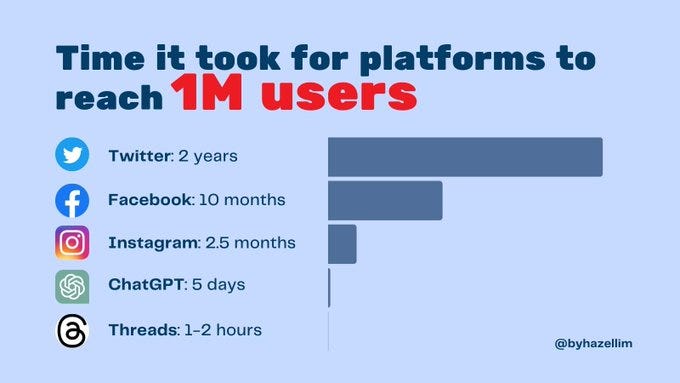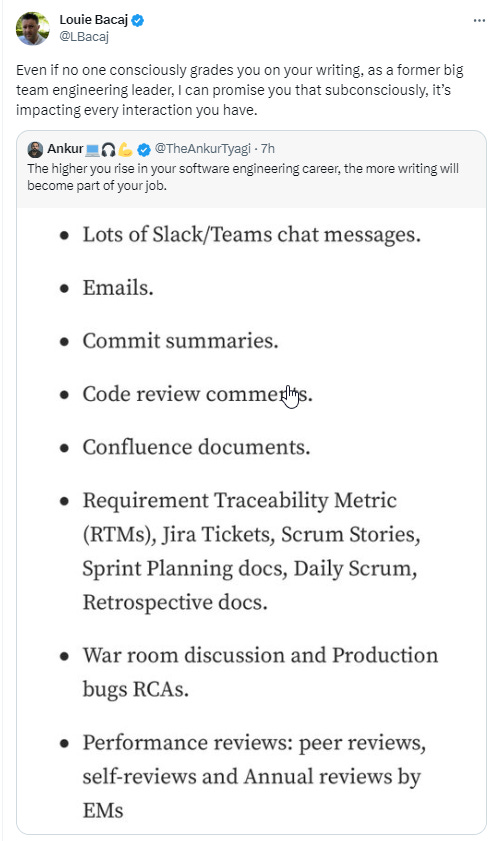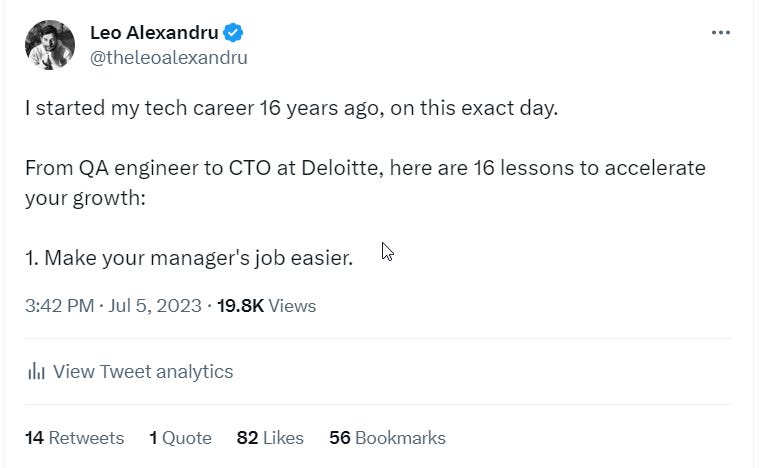#13: How math can help you find a partner
Applying "the secretary problem" to your decision making process
Hey friends,
In this edition, I talk about:
a rational way to make important decisions
the new social media app from Meta
3 tweets I liked
16 lessons from 16 years of Tech
a movie recommendation: Air
1/ How math can help you find a wife: the Secretary problem
This week I remembered a book I read a couple of years ago, called “Algorithms to live by”, written by Brian Christian and Tom Griffiths.
The book examines algorithms and concepts from computer science and looks at how they can provide insights into human decision-making and rationality.
One algorithm I found really useful is called the Secretary problem. But what is it?
The secretary problem is an interesting mathematical puzzle that can provide insights into decision-making. It goes like this:
You are hiring a secretary from a set of n candidates interviewed sequentially in random order. After each interview, you must immediately decide whether to hire that candidate, without knowing the merits of future candidates. If you hire a candidate, you cannot change your mind later. Your goal is to maximize the probability that you hire the best candidate.
The optimal strategy, surprisingly, is to reject the first K= n/e candidates and then hire the first candidate who is better than all those rejected so far. This strategy gives you a hire probability of 1/e (about 37%).
Of course, the secretary problem applies to any hiring you do and actually any decision you need to take.
Let’s be more specific. You want to hire a Project Manager in your company. It’s rather urgent so you want to get someone hired in 30 days. You ask the recruitment department about how many interviews they could schedule in this time frame. They say about 10.
So we have n=10.
You then figure out K = n / e = 10 / 2.71 = 3.69. You round up to 4. So k = 4.
This means that the first 4 people you interview are your sample. You won’t hire any of them. You will actually hire the first person that comes after this number who is better than the ones before.
By rejecting some candidates up front to gather information, and then hiring the first candidate who exceeds all previous ones, the probability of a successful hire is maximized at around 1/e or 37%.
It doesn’t sound like a big number, but it’s actually the best probability you can get.
And this applies when you want to:
buy a new apartment
find a new job
settle down
If you want to find a life partner, you can apply this solution in the following way.
Let’s say you are 30 and want to get married in 3 years. If you date someone new every 3 months, that would mean going on 12 dates in 3 years.
12 / 2.71 = 4.42.
So, your first 4-5 dates will be your sample set. You should not settle for any of these, but with the first person that comes after this number and is better than the ones before.
Of course, this is a purely theoretical issue, I’m not taking into consideration falling in love or other things that might happen. But from a rational point of view, this is your best shot at finding the best option for a partner.
Don’t say I didn’t tell you :)
2/ Threads: Twitter killer from Meta?
Very interesting news in the online social media space this week, Meta released a text-based platform, very similar to Twitter.
“The vision for Threads is to create an option and friendly public space for conversation,” Meta CEO Mark Zuckerberg said in a Threads post following the launch. “We hope to take what Instagram does best and create a new experience around text, ideas, and discussing what’s on your mind.”
The text-Instagram, as it was called, is gaining ground quite fast, with 30 million users signing up for the app on the first day of launch.
Meta’s response comes in a period of high turmoil in Twitter, caused by Elon Musk’s approach to leading the company. The platform is unstable and increased the API prices so much that most 3rd party businesses have gone out of business.
Musk is threatening Zuckerberg with a trial, on the allegations that the new Twitter competitor was built by former Twitter employees, hired by Meta.
Of course, he can’t win.
One issue for the platform is that it’s currently not available in Europe and it might never be, because of current EU regulations that Meta doesn’t seem to comply to.
If it won’t be available in Europe, I expect it to have limited success.
If it will be, I think it’s a big opportunity for the early adopters to grow there fast.
3/ Tweets I liked
3 tweets that made me think, educated me or amused me over the last week. (click on the images to read the whole stuff)
On why writing becomes a lot more important the higher you go up on the corporate ladder:
A funny one from Justin:
A reminder from the Stoics:
4/ My own favorite piece of content:
A couple of days ago I marked the anniversary of 16 years of working. This made me feel old, and a bit nostalgic, but also thinking about what would be some lessons from these years, and this turned in this thread:
Here it is, expanded:
I started my tech career 16 years ago, on this exact day. From QA engineer to CTO at Deloitte, here are 16 lessons to accelerate your growth:
1. Make your manager's job easier.
A manager's job is not always transparent to the team
But, usually, she has a lot on her plate. Take some things off that plate, and she will appreciate that a lot.
2. Come up with solutions
Everyone has problems. You will grow if you come up with solutions to them.
3. Soft skills > technical skills
The best programmers in my college class are still very good programmers. But that's it. The popular kid manages them. Soft skills matter more.
4. Loyalty counts
Companies go through good times and bad times. Stick during the bad times too.
5. Be reliable
Don't be the guy that overpromises and underdelivers. Be the one that your boss is confident to get the job done.
6. Prioritize learning
If you think you already know enough, that's your ego talking. Read and take courses. Strive to be better.
7. Seek mentorship
You think you can do it by yourself. Sometimes you can. Someone who is where you want to be will help you a lot.
8. Always move forward
In a company, you're moving backward if you don't move forward. 5 years in the same position? Something's wrong.
9. Give and seek feedback
We are blindsided sometimes. That's why we need to constantly ask for feedback. Both from our managers and our team. 10. Take risks You can play it safe. But you won't get the high gains. Volunteer for the project everyone's afraid of.
11. Invest in productivity
My passion for productivity and time management helped me a lot. Our brains are made to create things, not to remember them.
12. Measure and improve
Have metrics in place for the things that are important. Be transparent and plan to improve.
13. Think long-term
Rome wasn't built in a day, and chances are that you won't get a lot of promotions early on. Be patient. Think in decades, not months. 14. Expand your network Don't limit your interaction to your team and your boss. You never know who gets where.
15. Prioritize planning
Take time before every project to plan the high-level steps. It will save you a lot of time down the road.
16. Treat people kind
Be fair to everyone. Don't let your ego think you're better than anyone. Kindness will go a long way in today's world.
5/ Movie recommendation: Air
“Air” is the best movie I’ve seen in a while.
Directed by Ben Affleck and starring his long-time friend, Matt Damon, the movie tells us the story behind Nike's signing Michael Jordan in his first year of the NBA.
Long story short, Nike was not a big player in the shoe business at that time and it couldn’t sign any important sportsmen outside running.
I liked two things about the movie:
The way it recreates the 80s atmosphere (I was born in the 80s so I should know it, from the American movies, as it was a lot different in communist Romania), especially through the pop hits and the different period symbols
How the passion of some people can change the face of a company. While most business decisions should be rational, from time to time you need to listen to your gut and take chances. And this is what Nike’s Sonny Vaccaro did by believing in Jordan’s legacy when he was only a rookie.
You can watch the movie on Amazon Prime.
BTW, this reminds me to talk in a future newsletter about one of my favorite autobiographies, Shoedog, by Phil Knight (Nike’s founder, played by Ben Affleck in this movie).
Thank you for reading, and let me know if you liked something in particular in this newsletter.
Until next time,
Leo
P.S.: If you would like to read my content on a daily basis, don’t forget to follow me on Twitter and Linkedin.
P.S. 2: If you want to take your Productivity to the next level, check out my extensive Productivity course that can accelerate your career.







